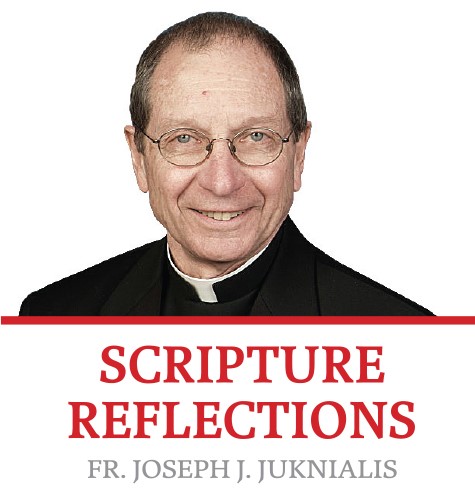Scripture Readings, April 10, 2022
Sunday, April 10, 2022
Palm Sunday of the Passion of the Lord
Luke 19:28-40
Isaiah 50:4-7
Philippians 2:6-11
Luke 22:14 – 23:56
Spiraled into existence by the very breath of God, all creation is alive with the heartbeat of God. Everything is because God is and, as a result, all creation is instinctively faithful. A tree stands rooted, eternally patient and ever faithful to what it has been created to be, giving shade to the traveler and fruit to our hungers. The cloud, borne on the wings of the wind, revives the earth with both rain and a respite from heat. It, too, is eternally faithful. So also the ant that ceaselessly toils, the lion that devours its prey, the soaring bird that sews the seam between the land and the sky — all of them faithful to their God-given nature, being what they are and doing what they do, all except we human beings.
All too often it is we humans who break with faithfulness. Created to be peace, we can too readily choose to be violence. Created as fountains of life-giving compassion, we become shriveled indifference. Created to be beauty, we disfigure and mar the very face of the Creator. Created by love to be love, we succumb to simply loving ourselves.
In the midst of such unfaithfulness, which so often will cloak human life, Holy Week tells the story of the suffering and death of the Lord Jesus, the story of the faithful one. Lured by cries of “Hosannah! Hosannah!”, he was not deceived by glory but remained faithful to the journey to which he was called. Abandoned by friends, he stood faithfully alone. Oppressed by fear that could cripple, he stood doggedly faithful, unwilling to surrender to that villain. Drained of all that might assure him of God’s presence, he hung stripped and naked, daring to blindly trust. He was the one always faithful to the end. His story is the story of what it means to be faithful.
For us to be faithful, then, means to be the persons God creates us to be, to be in harmony with the rhythms of the rest of creation, always true to our better angels, always in the image and shadow of the Lord Jesus.
The fact that we are able to choose, that we have a free will, is what makes us different from all else that God has created. Yet, while the rest of creation stands continually faithful to what God created them to be, it is our free will that then can create disharmony, that can cause our spinning lives to wobble out of sync with what the rest of creation is about.
It is our unfaithfulness that becomes the source of so much of our suffering. It is our unwillingness to accept life as it unfolds. As Peter Kreeft makes note in his book, “Making Sense Out of Suffering,” that “If I want x and I get y instead, I suffer, both because I do not get x, which I want, but also because I get y, which I do not want. But if I want only God’s will, I do not suffer, because I always get God’s will. We suffer to the extent that we are out of line with reality, ultimate reality, God’s will.”
We struggle with the idea of God’s will simply because of so much that plagues us with natural disasters and war and violence and debilitating illness and the destructiveness of human cruelty and sin. Surely, such evil is not God’s will. Yet if God is the heartbeat of all that is, then somehow God is present in all of that as well. Therein, then, is so much of our suffering, all rooted in our resistance to what is, always wanting what we want or what we think should be.
This then becomes the dilemma: how to know when to be docile, accepting what is as the will of God, and when to continue to resist, simply because so much of the suffering, so much of the evil, is not of our personal doing.
Our inner voices urge us to resist, to overcome evil, to make life better, all in what would seem to be a response to the promptings of God’s spirit. In the face of the disharmony in life, we have been created to be an instrument of God’s healing peace. Yet it is so often a question of whether those instincts flow from our egos or from God.
So, then, this week we gather to tell the story of Jesus over the course of seven days. He was the faithful one, willing to confront the disharmony and evil he saw in life, willing to absorb it into his own being when there was no alternative, willing to follow the path of loving sacrifice wherever it would take him, all simply because he believed it would bring him to the fullness of life.
REFLECTION QUESTIONS
When have you chosen to be faithful to life as it unfolded?
How has suffering shaped your life positively as well as negatively?

